Unforgettable
Photographs on walls, side boards and bedside tables.
Beloved ones and family members no longer among us.
Surfacing memories.
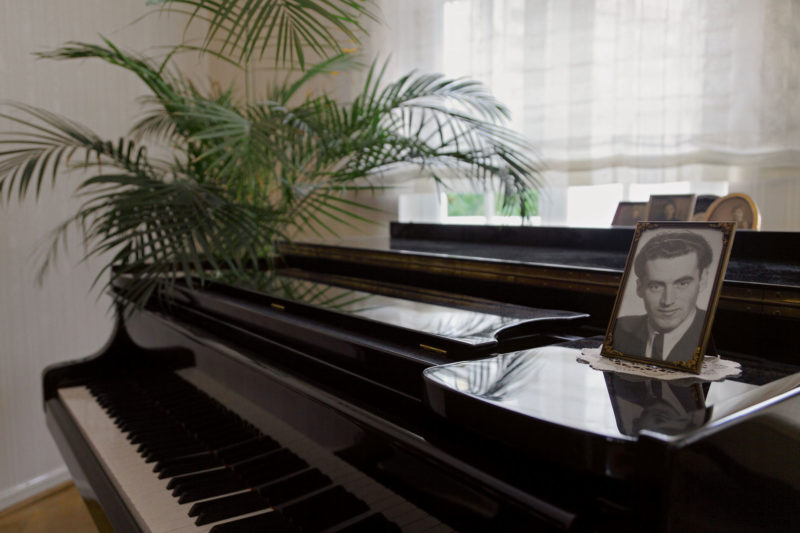
The Second World War really turned my father’s life upside down. He was 20 when the war reached the Ukraine, where he grew up. He never really wanted to talk about the times which followed. He was very probably deported, somehow muddled his way through and found himself back in Germany after the conclusion of the war, where he got to know my mother, and before long everyone called him Peter – although his real name was Stanislav. ¶ My father was and still is the most important person in my life: in addition I’ve “inherited” many of my characteristics from him – positive as well as negative. Our relationship was always full of conflicts, but in his final years it was also marked by mutual respect. ¶ This photo especially radiates an amazing love of life, I think. It was taken not long after the end of the war and stands on the grand piano – where I often sit and play, where all the most important people in my life have a place, so they can be near me. Whilst I’m playing I sometimes look at his face with a certain sentimentality. Then it comes to my mind that he could actually be proud that I became a halfway respectable person and didn’t throw away my musical inheritance. I would have loved for him to be longer at my side. | Harald, 58
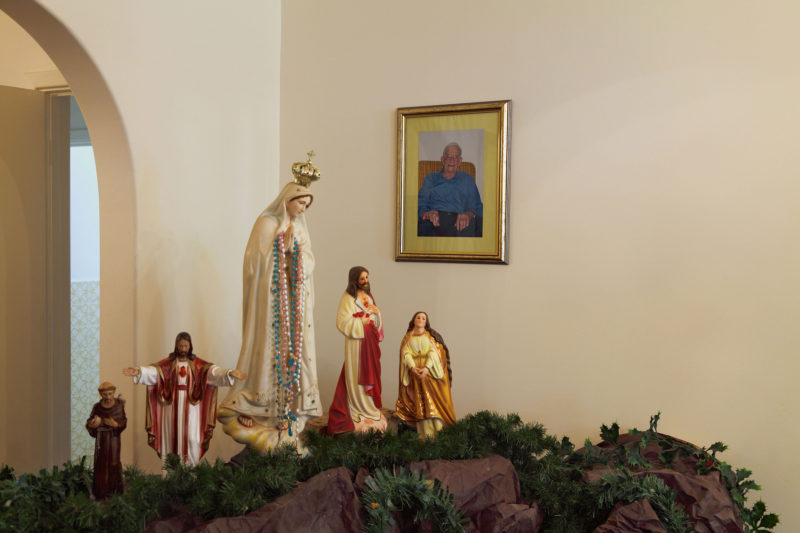
Everyone here calls me Lucy. No idea why. It’s all the same to me, but sometimes I think that the name Lucilia is really much more beautiful. My husband was called Manuel, he was a good man. He never hit me. We were married for roughly 60 years, I don’t know the exact number anymore. We had a good life, only we should never have emigrated to Australia. At the time I was sure we would return to our beautiful island of Madeira some time. But now Manuel is no longer alive it’s all too late. My whole family is living here. The children, grandchildren, great-grandchildren. Unfortunately none of the younger ones can speak Portuguese any more and my English is very bad. Luckily I can get Portuguese television here. ¶ I think the photo was taken when Manuel was 90. It hangs in the big room, where Saint Fatima also stands. I pray to her every day, for the Lord God to come and finally take me away. I want to be back again with Manuel in heaven. I pray every day for him and also speak to him. I ask him how he is and tell him I shall soon be back with him once again. Then I often have to weep. | Lucilia, 88
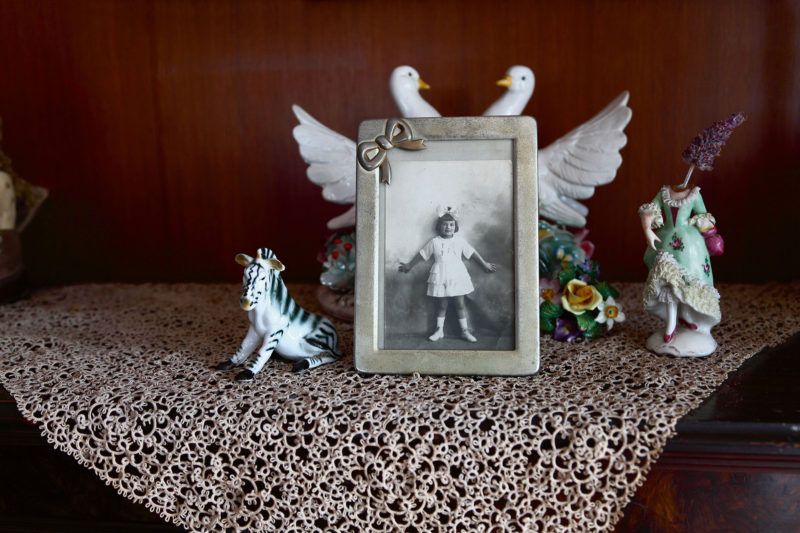
My mother seems always to have been like that, right from childhood. You can even see it on this photo, although she was still a small girl when it was taken. How old must she have been at the time? Three, four? No way older. Always at the centre of things, always the prettiest, always the person who knew everything better than all the others put together – even by that time already, I think. ¶ Although I’ve got thousands of photos in boxes and cases, this one is the only one of my mother in the house. Really only because I like the old frame. Oh yes, there used to be one hanging in the corridor, but in the long run that was no good for me at all. I simply couldn’t stand my mother gazing at everything I was doing. One day I even thought I could feel her disapproving looks in my back. Well, without more ado I got out a photo of my father, put it in the frame and banned my mother to the back side. Now she’s forced to look at the wall the whole day and I’ve got my peace. | Evelyn, 66
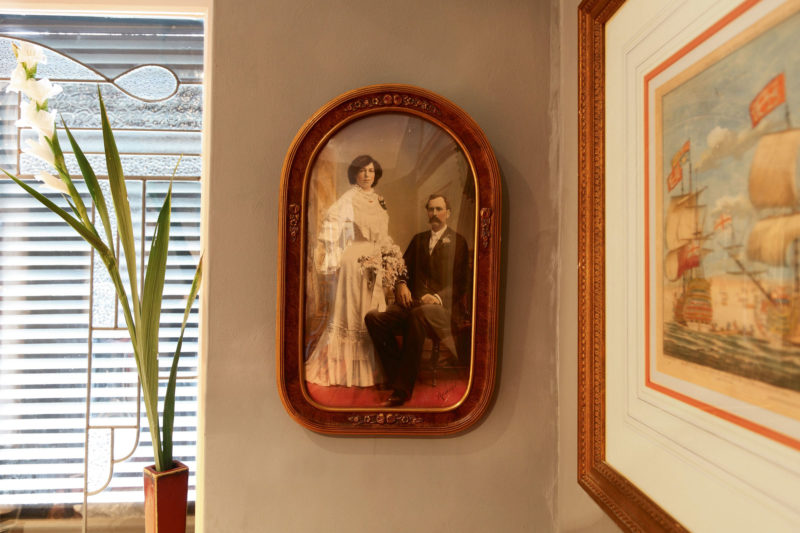
Whenever I look at the newly married couple in this photograph, I start searching for similarities with myself, with my children and grandchildren and I wonder which characteristics we inherited from them and how hard their life was as pioneer farmers in South Australia. ¶ He, Thomas, was of Irish descent. Ethel Maud came from a wealthier family with English roots. My great-grandmother disapproved strongly of the marriage. She thought Ethel Maud had married beneath herself – the English considered the Irish to be second class citizens. That kind of thinking was prevalent in those days. But my great-grandmother misjudged Thomas: he became quite successful later on. They had eleven children, seven boys and four girls. My mother was the second youngest. ¶ After she passed away last year none of my brothers and sisters seemed to be interested in having this marvellous wedding picture. It was taken in the year 1906 by a professional photographer, one can see that. It fits in well with other artworks in the room and makes it feel like an old fashioned, quiet parlour. ¶ It is a joy to me to have Thomas and Ethel Maud here with me. Hopefully they will stay in our family property for a long, long time! | Helen Maude, 56
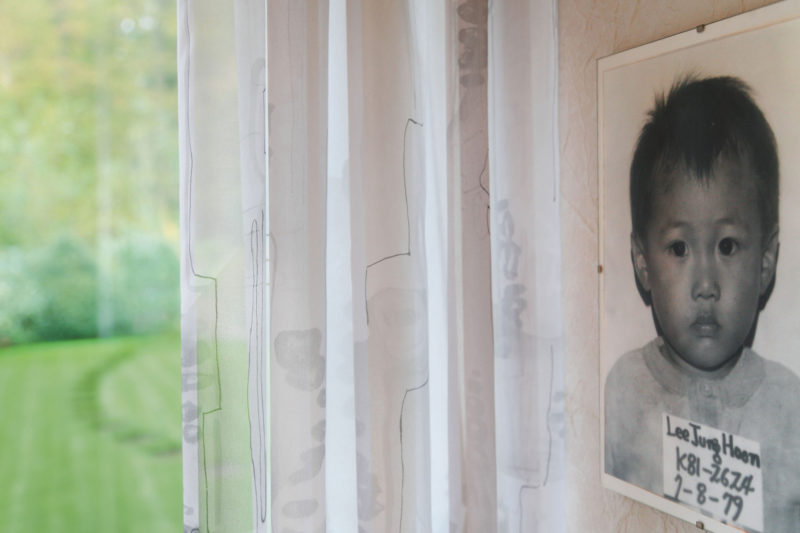
This is the first photo of our son. It was sent to us by the adoption agency. Jung Hoon, a little Korean orphan; our youngest! He looks really serious and somehow seems lost. Not a pretty picture, such a small kid photographed like a criminal. And yet this photo means a lot to us because it represents a new beginning. It hangs next to the garden window where the path leads to the wood. The path he often took. ¶ He was two and a half years old when we picked him up from the airport with the whole family. Now Tobias, as we christened him was finally there. A serious child indeed. He needed a lot of love and affection, and we’re happy that we were able to give him both. ¶ When Tobias was eighteen, we would have loved to have gone on a journey with him back to the country where he’d been born. But at the time he was not really interested. Later when the cancer was already there, he didn’t have the strength anymore. Half a year after his death – he was only 22 – we both went to South Korea to look for his traces. Our time there did a lot to help us accept that we had only been able to accompany our dear son on a very limited timespan. You might say that this journey enabled us to get to know Tobias even more intensely beyond death. | Adelheid und Gerhard, 71
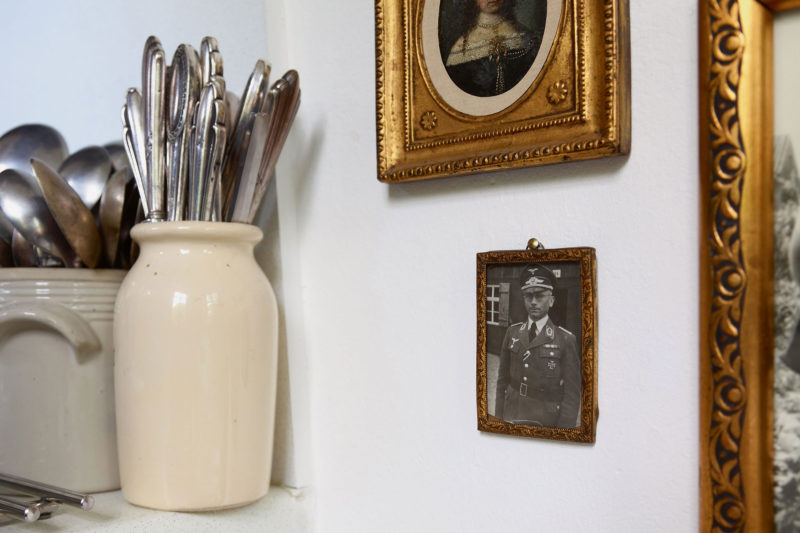
Yes; my grandfather. He accompanied me throughout my whole childhood. Although my father’s father died as early as 1945 in a POW transport to Russia, he was always present in the form of a photograph: in a black frame next to my grandmother’s bed. She loved telling me about the good old days. Stories which were divided into “before the war” and “after the war”, but seldom “in the war”. Stories that really inspired my imagination. ¶ As a child I often wondered; who is this old man in spectacles with the hard forbidding face, standing in front of the barracks in this uniform. He would stare at me out of the picture frame so thight-lipped and austere that I was even a little afraid of him, although he was no longer alive. A small picture, a large riddle. ¶ People at home talked about him a lot. And as long as grandmother lived we would have a big festive dinner every year to celebrate his birthday in November. White damask, glasses sparkling in the candlelight, a leg of veal in port wine and other mysterious delicacies. After the dessert we would toast the dead Max Julian. Mystifying rituals. ¶ When I got older and nobody would give me a satisfactory answer to what happened “in the war”, I decided to study history and try to find out myself. Now grandfather’s photo hangs in our kitchen and gives me constant food for thought about the complex nature of good and evil. When I’ve got some spare time in future I should like to solve it: the secret of my far-off, but still ever present grandfather. | Volker, 60
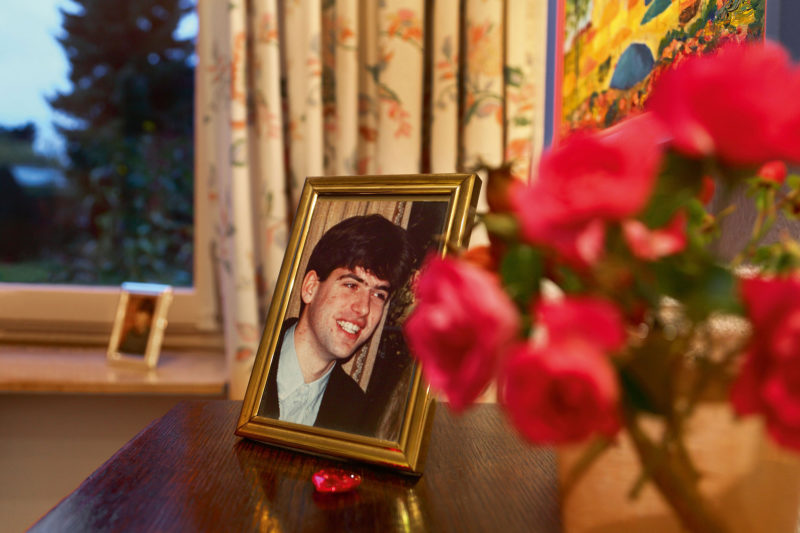
There’s at least one photo of Martin in almost every room in this house. I need him about me, everywhere. It took me a really long time before I was in a position to accept the loss of my son to a certain extent. The same question was going round and round in my mind the whole time: “Why Martin? Why did it have to be him?” ¶ My husband, my daughter and many friends were an immense help. They were there for me day and night, despite their own pain. ¶ It was just before Martin’s A levels when it happened. He still had his whole life before him. He was self-confident, gifted, and almost always in a good mood, well loved and hungry for life. Where would he be today if that terrible thing hadn’t happened to him on that March
evening shortly before his 19th birthday? Darkness, ice, a bend in the road, the tree, a few split seconds. The doctors assured us he hadn’t had to suffer. The accident spot is not far off but I avoid this country road and – even now – prefer to take a roundabout way. ¶ The loss of my son has left behind a deep wound, which is only healing very, very slowly. Now gradually, so many years after his death I might even be able to live without his photos. Now at last I have Martin within me. | Margot, 67
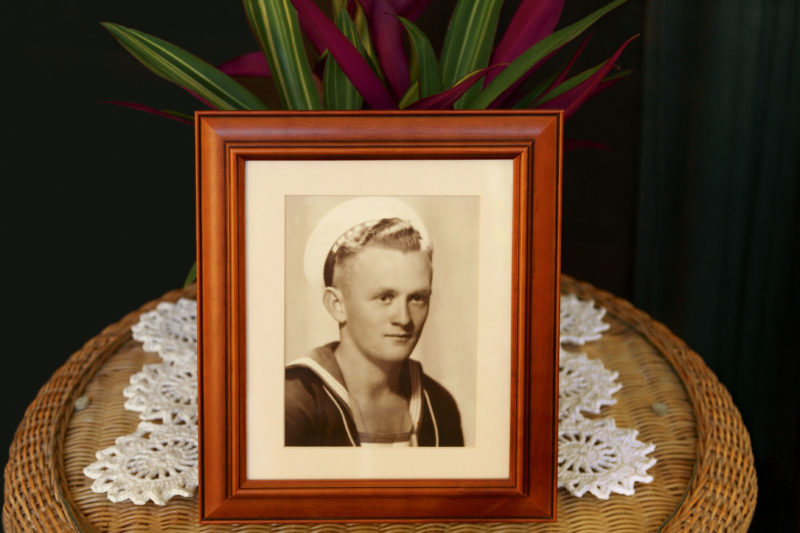
I love this photograph of my late husband. He looks so young and handsome and innocent. It was taken about 70 years ago at the time he joined the Navy. Many Australians were killed in Europe and the Pacific during the Second World War. Luckily he came back. ¶ His photograph stands on a small table in the living room. That way everybody can see him and he can see us. Yes, I have conversations with him, although he is not here anymore – gone almost ten years. But that’s too personal to talk about. Very often I have the feeling that he’s still here with me. I miss him every single day. | Kathleen May, 87
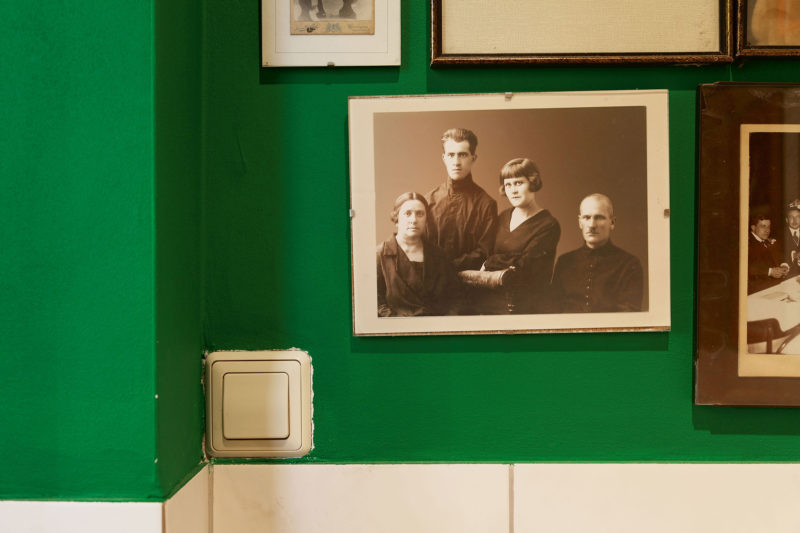
There’s a crazy story behind this photo. It shows
Anastasia, Afanase, Aleksandr and Antonia. It’s my
Russian family, of whom I knew nothing at all for
a long time. The picture hangs between all my family
photos in the toilet. There there’s plenty of spare time
to look at them time and time again in peace. ¶ Well,
my grandfather was of Russian origin and fled to
Paris after the October Revolution in 1917. Then
at sometime or other he got to know a pretty French
woman. And she became my grandmother. That was
about all I knew. And then around 10 years ago this
letter from Moscow dropped through our letterbox.
From our Russian relatives there! It was so exciting
that it wasn’t long before my mother and I flew there.
It was mind-blowing suddenly to have relations who
you’d never known existed. They gave us a lot of photos and I selected this one
here. My eastern roots so to speak. I’m continually looking at their faces and
imagining their life histories. Since then I’ve become much more interested
in Russian music, literature and art. What an unsuspected enrichment
of my life! | Marisa, 48
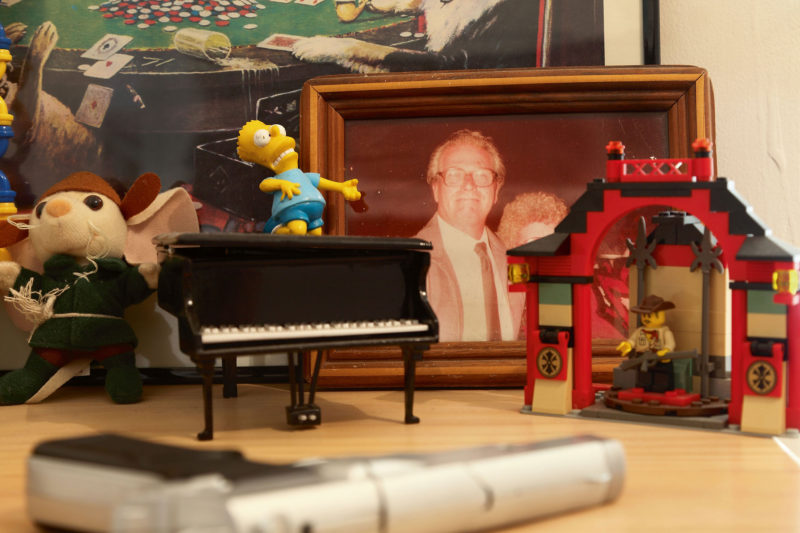
Das ist mein Opa, er hieß, glaub’ ich, Albert mit Vornamen und kam aus England. Manchmal schau ich mir das Foto an und frage ihn „Wie geht ’s Dir, wo auch immer Du jetzt bist?“ ¶ Er war schon lange tot, als ich geboren wurde. Schade eigentlich, denn er ist mein Held! Deshalb steht das Foto in meinem Zimmer auf dem Schrank. Mein Papa hat es mir geschenkt. Davor dann das Spielzeugklavier, denn Papa hat gesagt, dass Opa immer so gern Klavier gespielt hat. Dann hab ich noch Bart von den Simpsons drauf gestellt und den Cowboysaloon und den Revolver dann davor. Denn mein Großvater ist ein Superman. Er würde mich und meine Freunde immer und überall retten. Das träume ich manchmal. Pech für mich, dass er nicht mehr lebt. | Asher, 10
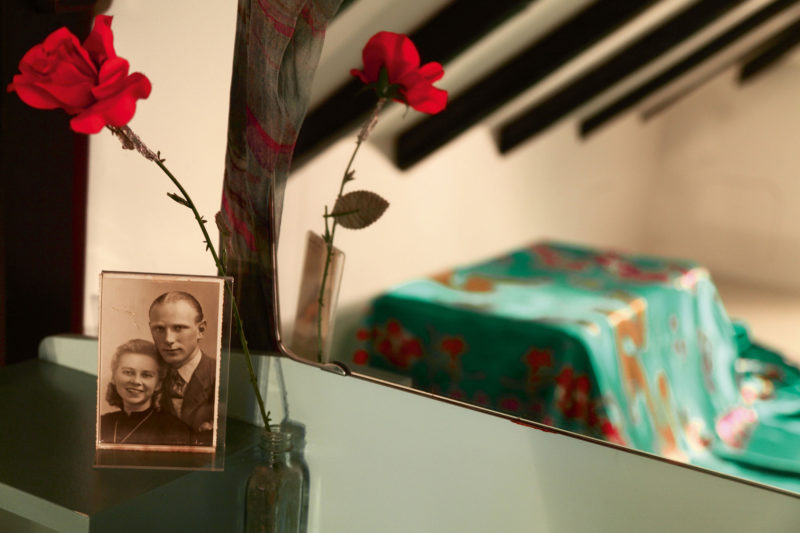
Schön sehen sie aus, meine Eltern auf ihrem Verlobungsfoto. Auf der Rückseite steht in der unverwechselbaren Handschrift meiner Mutter „Nikolaustag, Dezember 1945”. Der Krieg war vorbei, die Niederlande befreit. ¶ Extra fein angezogen haben sie sich. Vielleicht hat er sie mit dem Fahrrad abgeholt, und sie saß hinten auf dem Gepäckträger, ihre Arme um ihn geschlungen. In jede Kurve hat sie „bitte nicht so schnell, Johannes!” gerufen. Ich kann nur mutmaßen, nicht mehr fragen. Johannes starb vor 18 Jahren, einige Zeit nach seiner Pensionierung. Meine Mutter wird es nicht mehr wissen, wie sie so vieles nicht mehr weiß. ¶ Das Foto sollte so etwas wie ein Versprechen sein: Bald werden wir heiraten, eine eigene Familie gründen, Kinder groß ziehen. Die schlechten Zeiten sind vorbei, die Zukunft gehört uns. Und so kam es auch. Man kann es auf diesem Foto schon sehen. Sie voller Liebe, Fröhlichkeit und Optimismus, er verantwortungsvoll und ernster, aber nicht ohne Schalk in den Augen. Zusammen bildeten sie mein glückliches Elternhaus. Ein warmes Gefühl durchströmt mich, wenn diese beiden Menschen mich aus ihrer Vergangenheit anschauen. | Janneke, 56
